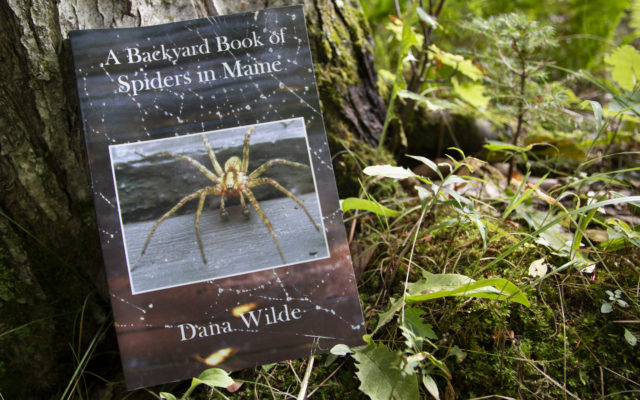
Naturalist sheds light on Maine’s spider world in new book
With eight spindly legs and rows of shining eyes, spiders often rouse goosebumps and shrieks of surprise. But what else? Diving into the mysterious world of these creepy crawlies, “A Backyard Book of Spiders in Maine” by Dana Wilde was released earlier this summer by North Country Press.
Not your typical guidebook, the resource is imbued with Wilde’s deep fascination with spiders and their complex behaviors. And his wonderment is infectious.
“The thing that really gets me about them is how intelligent they are,” said Wilde, who lives in Troy. “There are a lot of studies in the last 15 to 20 years on [spider] behaviors that really imply that spiders have individual personalities, that they aren’t just pre-programmed, instinctive automatons.”
A self-taught naturalist, Wilde conducted years of research and worked with spider experts throughout Maine and beyond to write the book, which he believes to be the first of its kind.
“There’s quite a bit of scientific literature on spiders of Maine, mostly thanks to Daniel Jennings, but there was no book about spiders peculiar to Maine or the Northeast really,” Wilde said.
In the 188-page book — which is richly illustrated with photos, drawings and graphics — Wilde describes many of Maine’s 600-plus species of spiders, organizing them into groups and offering some truly mind-blowing facts along the way. This catalog is broken up by essays on specific topics, such as the incredible engineering involved in the spinning of a spider web and toxicity of spider bites. He even explores how different spiders weather the harsh Maine winter.
Written for the everyday person who’s simply curious about nature, the book features a section in the beginning that sheds light on how spiders differ from insects and ticks. This introductory chapter also defines spider-related terms that will be used throughout the book. That way, you won’t get lost in jargon. And it debunks a few false generalizations about spiders. (For instance, did you know that not all spiders have eight eyes?)
But what really makes the book accessible and engaging are the personal stories that Wilde peppers throughout. In these tales, his own passion for the topic breathes a certain energy into the writing that encourages the reader to get up, go outside and seek out a spider to observe (as opposed to running the other way).
“I love this book,” wrote celebrated nature writer Bernd Heinrich in an endorsement on the book’s cover. “The personal anecdotes in ‘A Backyard Book of Spiders in Maine’ make them real, and they show how Dana Wilde is passionate about them, making it fun to follow as he opens a new world, not just to those spiders of Maine but through them to the rest almost anywhere, to anyone. There is so much fascinating to see in nature, as this book shows.”
One of Maine’s flashiest spiders, the black and yellow garden spider, sparked Wilde’s interest in spiders several years ago. He noticed a group of these large spiders weaving intricate webs in a field in Unity, and his observations of arachnids branched off from there.
At the time, he was writing a weekly column, “Amateur Naturalist,” for the BDN, which ran from 2005 to 2012. In it, he expressed his growing fascination with spiders, and many other wild creatures.
“Whatever got my attention that week was what I wrote about,” Wilde said. “The more pictures I took [of spiders], the more fascinated I got. Soon enough, it seemed I could make a book out of it.”
This isn’t the first time Wilde has created a book out of his naturalist observations. He has written a number of other books, including “The Other End of the Driveway: An Amateur Naturalist’s Observations in the Maine Woods” and “Nebulae: A Backyard Cosmography.” In addition, his column “Backyard Naturalist” currently runs in the Kennebec Journal and Morning Sentinel.
Though Wilde’s big spider project is complete, he continues to observe them on a regular basis at his home in the woods of Troy. His wife, Bonnie, has learned to alert him any time she spots a particularly interesting specimen. For instance, just the other day, she found an egg sac belonging to a nursery spider under a daylily leaf in the garden.
“The nursery web female guards the web with the eggs and then guards the little spiderlings for a week or two,” Wilde said. “So we started looking for her under the leaves and sure enough, there she was.”
That same day, the egg hatched and tiny spiderlings emerged.
“We watched them every day to see how things went,” Wilde said. “The mother sort of turned the nursery web into the two different webs, then recombined it into one.”
One day, they noticed that when Bonnie spoke, the tiny spiders would jump as if surprised, then scurry around frantically. So — of course — they conducted a little experiment. And every time Bonnie spoke, they’d respond by moving around.
“But they were doing it a little less and less,” Wilde explained. “By the fifth or sixth time, the spiders weren’t bothered anymore. So what happened? Either the little spiderlings themselves figured out that the voice sound wasn’t a threat, or we were thinking maybe the mother figured it out and signaled to them through the silk that it was OK.”
These are the types of stories you’ll read in “A Backyard Book of Spiders in Maine.” It’s a book in which hard facts mingle with the author’s curiosity, leaving some unanswered questions for readers to explore on their own. It invites you to pick up the magnifying glass, ignore the goosebumps and examine Maine’s many spiders in all their intricacies.
“Spiders are good,” Wilde said. “They just look like monsters, but they’re not. Not really.”
“A Backyard Book of Spiders in Maine,” retailing at $26.95 in paperback, is available at local bookstores and can be purchased online through North Country Press at northcountrypress.com.